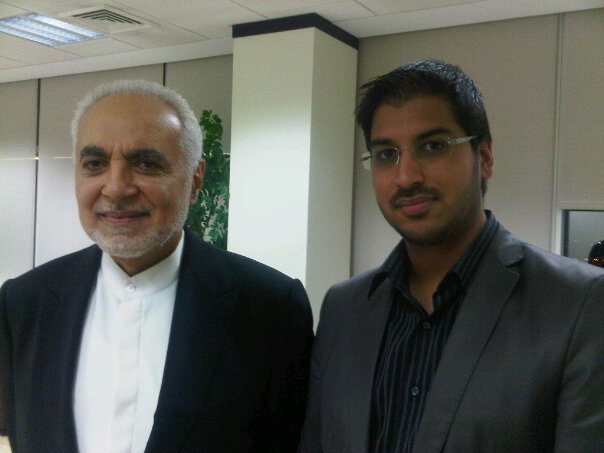"There is a deep linkage between Judaism, Christianity, and Islam - structurally. We have to shift the divide and elevate the discourse...As Muslims we also have to get back to our values - where are the synagogues that were there for hundreds of years in [my birthplace] Egypt?"
With rhetorical flourish in Dubai, Imam Feisal Abdul-Rauf, the face behind the controversial Islamic community center called Park 51 (previously called Cordoba House), praised America and called for interfaith understanding. It was hardly the performance of a figure that Fox News and others have portrayed as an ally of extremists. The three hours he spent at the Dubai School of Government today included an Iftar (the meal to traditionally break fast during Ramadan), a lecture and Q&A, and evening prayers. At no point did he break from his core message, that his Islam is one that is authentically American, and that America is in congruence with the core values of his faith. He spoke in Arabic, and he spoke in English, and the words were the same.

For the Imam, his trip has been extremely difficult. He has taken comfort in several Jon Stewart clips, as well as the statements by Mayor Bloomberg. He told me that he has felt he is surrounded by "turbulence" and subject to "winds from all directions." Indeed the entire world media is clamoring for statements from him; the moment he did give one interview yesterday in The National (UAE), he was criticized for speaking on a domestic issue from abroad. Thus Imam Feisal is in a dilemma. In the Middle East, however, he has been touring Qatar, Bahrain and the United Arab Emirates, hosted by the U.S. State Department and ferried to various public fora. The reception has been largely positive, and today was no exception.
The audience at the Dubai School of Government, consisted of a motley crew of journalists (from CNN, ABC News, Reuters, and a bevy of local papers), students, financial professionals, government officials, and academics. Largely Muslim, but not exclusively so, the crowd hailed from nearly every country in the region. Libya. Syria. Iran. Pakistan. The list including any number of nationalities perceived as disposed against the United States. While he refrained from any significant commentary on the Islamic center itself, the Imam did not hold back, neither in his humble praise of his country, nor from his criticisms of many contemporary trends in the wider Muslim community.
"Like many of our fellow Muslims, we found our faith in America...My country and my faith are knitted together."
His words went beyond the superficial. The Imam cited that the American Constitution and Declaration of Independence expressed Islamic values of life, dignity, religion, family, property and intellect. Interspersed in his remarks were references to the Qur'an and the Hadith (sayings of the prophet) to substantiate his points. What surprised many in the audience was when he went even further, challenging some Muslims for neglecting the values within Islam, and its inherent principles of tolerance. He said that many Muslims have in fact "made Islam itself into a god to worship," while forgetting its "inner concepts." He said that in centuries passed it was natural to have different religious and ethnic communities living side-by-side within Muslim societies. What has happened, he asked, in the last fifty years, as many of the Jews and other minority groups have emigrated from countries such as Egypt, for example? He answered his own question, "We are poorer for it." The audience's reaction was applause and enthusiasm.
On his way back to the U.S., Imam Feisal faces a difficult challenge. With various protests organized for September 11, the atmosphere in the country, where nearly two-thirds of those surveyed oppose his new community center, will only get more volatile. The Imam himself commented that "the political season" is charging the atmosphere, and that much of the opposition is exploiting that.
His voice in the the region and wider Muslim community has been one of moderation, as he has sought to build intercontinental and interfaith bridges. Those in the audience today, will be waiting to see what is the reaction of most Americans upon the Imam's return to his country in just a few days.
Taufiq Rahim is a Visiting Scholar at the Dubai School of Government and blogs daily at TheGeopolitico.com
